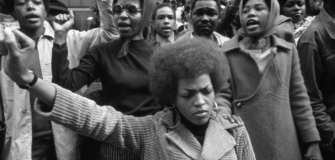Blavity: When We Talk About Consent, Who Are We Really Talking About?
Share
Read article in it’s entirety at Blavity.com…
By Donna Oriowo
Consent often seems like such an elusive concept to many. The idea that you can take and hold power over someone else’s body, against their will, shouldn’t even be a concept up for debate. I’ve been taught and told that there is a lid for every pot. People can find their match. You can find someone who wants to have sex with you, wants to look at you, wants to hold you, etc. It’s true, even if the only person who wants you sexually is Y-O-U.
But finding a willing partner or opting for solo sex has never been the problem. The problem has always been power and its distribution. Rape, after all, is not about sex, it’s about power, and those who exert their will over others to prove something (their own greatness?) to themselves. What befuddles me is that with the #MeToo movement (started by a black woman, Tarana Burke) there are so many folks who know people who have been impacted by sexual assault. However, no one seems to know anyone who has committed sexual assault. Ain’t that strange? It’s been said before, but it seems truly sad to believe, that there are still so many people wandering the world thinking, or rather, pretending, that they are not someone’s reason to say “me too.”
As a sex educator and relationship therapist who works with mostly black women, it also annoys me that when we talk about consent, we very rarely are talking about black women or women of color. The rights to healthy sex and sexuality have been hijacked, and women of color have been left out of the movement, even when they are the creators. I reference Tarana Burke because while so many are busy praising Alyssa Milano, giving TV shows to Rose McGowan or speaking about the triumph of the TIME magazine cover, which speaks about the #MeToo movement, anti-blackness is still running rampant!
Black women have been given the sexual tropes of the mammy who is asexualized, the Jezebel who is hypersexualized or the Sapphire who is emasculating. Drawing attention specifically to the Jezebel, the purported trope remains that black women are over-sexed and only want sex. Everything we do is hypersexualized. For example, take newscaster bae. Her body in a red dress was hypersexualized for various reasons, but certainly because black women with larger breasts and butts are considered sexual deviants for consumption (Sara ‘Saartjie’ Baartman comes to mind). The idea continues to be perpetuated that black women cannot be raped because of our supposed want or need for sex, that is almost masculine in nature — giving the assailant a pass because they believe they are just giving black women what they want. Right …
And of course, I must bring up slavery. To not bring it into the conversation would be a great injustice. It means that I’d be examining a concept without acknowledging its roots. Slavery was a time period when black people were literally someone’s property, and brought to this country without their consent. Back then, black people were bought and sold like a bottle of water, to be used and disposed of accordingly. With the racist antics that are still endured today, can anyone really believe that slavery has nothing to do with the continued abuse of the black body? In a country where sexism has been the buttered bread, was there ever a time you would consider sexism not to be a part of the problem? This is why we need to study intersectionality. Black women are at the intersection of being both black (in the past, the property of white men) and women (the property of the husbands, fathers and brothers they have). If you are, or have been, considered property twice over, where is your freedom? Where is your right to choose for yourself?
How would white people, who maintain white supremacist ideas, react to an uppity black person not staying “in their place”? How do men react to a woman who is loud, proud and so-called “emasculating”? I believe the answer is that they feel the need to re-exert their power, by any means necessary. I do believe that this is the reason for rampant domestic violence. I do believe that this false narrative of white people and men being God’s own chosen people is the reason for rape. It’s like Manifest Destiny, but on people. The need for white men to dominate brown and black bodies isn’t really being explored within the context of consent or the #MeToo movement, unless you count the few black and brown folk who do say something. But somehow, even then, they are never really counted.
Consent is still a concept bathed in White Supremacy. It still seems that only white women can be raped, but only if the white male raping her isn’t drenched in financial privilege. Look at the evidence — Weinstein only remembered a different set of events for one woman, Lupita Nyong’o. White people continue to doubt and lay blame at the feet of black women. But are men of color so different? Even with them, there is still a need to exert power over the female body, to prove one’s manliness. Look at the whole Cosby debacle. Black men, and some women, continue to defend him to the ends of the earth, rather than take a close look at what he was being accused of and by whom. Out of the dozens of accusations of drugging, sexual assault and rape, black men were crying foul because white women, by lying about sexual assault, have been known to trap black men into a cycle of race-based violence. You only need refer to Emmett Till to understand the doubt. But even then, you have to intentionally ignore that there were also black women and women of color making the same accusations. But somehow, their voices never seem to count.
Somehow, when black female voices are raised up in anger, in disbelief and in pain, they are easily ignored. There are explanations given as to why it couldn’t be true, because after all, who really wants to rape the mammy, right? She’s big, black, and friendly, asexualized to make it seem like fodder. Those mixed races babies from times of slavery had to come from somewhere, though. Who do you suppose they had to rape to have them? Seeing the black woman as the mammy, or anyone who has the darker skin, kinkier hair and/or larger bodies, makes sure there is little credence given to those who would add their voices to the crowd of #MeToo.
I believe that the Weinsteins of the world will be forgiven. They will be allowed to move forward with their lives, while the people they hurt still have #MeToo at their fingertips and on their lips. So in that sense, consent is not just rooted in white supremacy, it’s also firmly attached to capitalism and the power people feel when they have money, or the power they feel they need to re-exert. It’s a double edged sword. Those with means think they can have anything and anyone, even if they aren’t wanted. And those without means want to take from others so that they can feel powerful in that moment.
To quote a friend and colleague, Ericka Hart, when we talk about consent, who are we really talking about? “Who is this [conversation] for?”
Photo by Leighann Renee on Unsplash




Follow Us